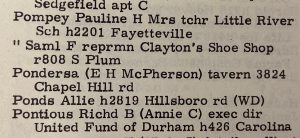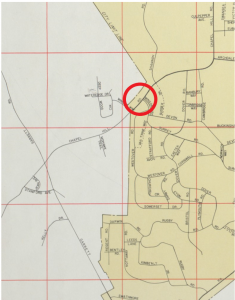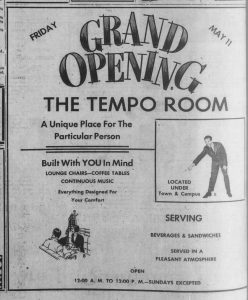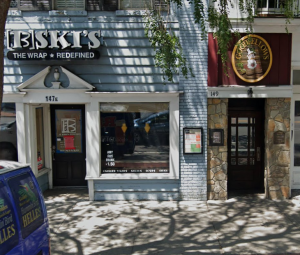This article is about structures and formations on the landscape of 20th century Orange and Durham Counties in North Carolina. These are the lands of the Eno, Skaruhreh/Tuscarora (North Carolina), and Shakori.
… there was a place in southern Durham County, I think called the Ponderosa…. It was out in the boonies and people would go out there for drinks and get together.
And around the [Duke] campus you could meet people, too. But it was much more open in Chapel Hill than it was in Durham. Once at a Friends of the Library dinner at UNC, there was a visiting speaker…, a poet. She spoke to the group and made very clear that she knew of the scene at the Wilson Library and people were like (he gasps).
I don’t know about the scene for blacks. Sometimes you’d see blacks in these other places, of course.
Interviewer … at the Ponderosa?
Interviewee Yes, oh yes. It was a very democratic crowd, I would say.
— interview with Anonymous, from Love and Liberation: A History of Durham’s LGBTQ+ Community
Numerous spaces for socializing and solace were central to the LGBTQ community of the Triangle area in the early 1960s, and this is the story of 2 of them. Word of mouth helped to share information about safe and joyous places for queer people to get together. Even if the original physical structures are gone today, or in some cases now repurposed, the importance of these as queer spaces remains articulated through even sparse information in the archives.
Despite frustratingly few mentions in the record, the archives do reveal traces of the bright, short life of The Ponderosa Tavern, which was in Durham County, 1964-1965. It was a bar that served food where LGBTQ people could also freely dance together in public. It was a house right at the city limits of Durham, and especially for those coming from Chapel Hill, thought of as out in the “middle of nowhere” in a relatively undeveloped area at the time.
The Ponderosa is mentioned in two oral histories about queer life in Durham and Chapel Hill in the 1960s, and these testimonies show how fondly the tavern is remembered by the LGBTQ community.
It (PONDEROSA) was between Chapel Hill and Durham, but it was over the Durham County Line, which was very rare. It was actually in Durham County, the Tempo was the gay bar, and because it was in Chapel Hill, it was fine. For something to open in Durham, was quite rare. My lover and I used to go there at the end of 1963, most of 64. It didn’t last very long. There was a little like kind of drive in grill, that is what it was, not a hot dog stand, but like a diner and in the back of that was a big, concrete, rectangle building like a VFW Hut and it turned into a gay bar. It was the only bar that you could dance in south of Washington and north of Atlanta in the 60s. A lot of lesbians went there, a lot of gay people went there.
…
The dance floor at the Ponderosa was a linoleum floor. I don’t think that it lasted a year and half. Again, by this time, the fellow that basically brought me out physically was still with the newspaper in Durham and told me about it. We went there and I told my lover at the time and he was very aware of the Durham authorities knowing that it was going on. At that time, it was kind of scary for two men to dance in public, but their whole attitude that he reported to me was that as long as there was no trouble there, as long as people are discreet and don’t break traffic laws and don’t do it in the street and scare the horses, there would be no problem. It was very open, I was very proud to be a Durhamite, and that this could go out of Chapel Hill, Atlanta, Washington and that sort of thing. But, it didn’t last very long and I don’t know why. Being in a relationship, we didn’t go that much to the bar.
— Bill Hull interviewed by Chris McGinnis, June 21, 2001. Interview K-0844. Southern Oral History Program Collection (#4007), Southern Historical Collection, University of North Carolina at Chapel Hill.
From these testimonies, we know that The Ponderosa was exclusively queer, and the anonymous interviewee quoted at the start of the post states that both Black and white people partied there. In the interview with Hull, McGinnis asks who owned the tavern, and Hull said that he did not know. Public and archival records do reveal this and more information about the short life of The Ponderosa.
Before the site was the Ponderosa Tavern, which would have been before 1963, it was known as a restaurant called the Round House. The Durham city directory shows that the name changed in 1963 to Ponderosa Tavern and was owned by Elwood Harris McPherson with the address 3824 Chapel Hill Road. This was the main route to get from Chapel Hill to Durham, hence the name, and is now known as Old Chapel Hill Road thanks to the quicker option of the 15-501 highway.
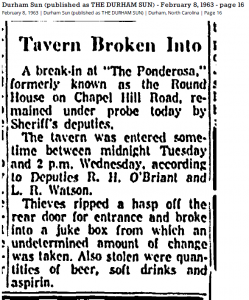
The only mention of the Ponderosa in local newspapers, describing a break-in, but also identifying it as the old “Round House.” 1963.
McPherson is listed as a driver in the 1965 city directory, having ostensibly changed jobs and sold The Ponderosa to Chapel Hill’s Henry Floyd Watts. It is at this point that the site becomes a refuge and social outlet for the local queer community.
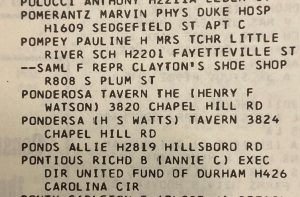
Henry Floyd Watts is curiously listed as both Henry F. Watson and HS Watts in this 1965 Durham city directory.
Henry Watts owned The Ponderosa Tavern from about 1964-1965, indeed a very short time span. Records show that Watts operated two adjacent pieces of property, 3820 and 3824 Chapel Hill Road, as Ponderosa. In 1966, the property at both numbers becomes vacant. Bill Hull is correct – the Ponderosa as he described it, as a safe place for the LGBTQ community, only existed for about one year.
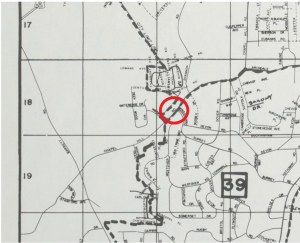
Map showing the voting precinct boundary lines and voting places of the City of Durham, Durham County Board of Elections, 1975.
Click on the maps to show the location of where The Ponderosa was in the early 1960s. It was torn down after staying vacant for a short time. The house stood where the entrance to Windsor Commons is now, which you can see below.
While described as remote in the 1960s, this 1887 map of Durham County below shows a number of churches, mills, and residences along what is now Old Chapel Hill Road.
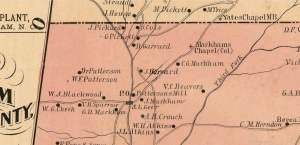
Close up of Patterson Township area, 1887, where the Ponderosa was and is now Old Chapel Hill Road near Hope Valley. See also https://dc.lib.unc.edu/cdm/singleitem/collection/ncmaps/id/531/rec/2
The trace of The Ponderosa could have faded, had Henry Watts not owned another famous bar, at least for Chapel Hillians, called The Tempo Room. It would seem that the connection of Watts between these two important queer spaces has not been known.
When Watts bought The Ponderosa over in Durham, he had already owned The Tempo Room for some years. The Tempo opened at 149 East Franklin Street in 1956.
Throughout the 1960s, The Tempo was not only a destination for UNC-Chapel Hill students to engage in formative Pabst Blue Ribbon consumption but very famous people also hung out there. It also became known as “the” gay bar in Chapel Hill in the early 1960s, although not exclusively queer. The 1960s saw some exclusively queer destinations like Pegasus (now The Cave) appearing on Franklin Street to join The Tempo. It would be a reasonable guess that since The Tempo was so friendly and welcoming to the LGBTQ community, the sibling tavern of The Ponderosa would have been established with the same reputation.
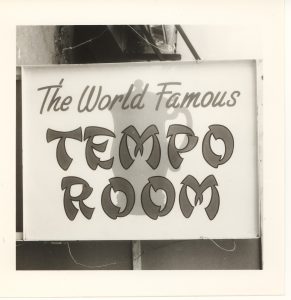
Photograph of sign for The Tempo Room, Franklin Street, from the collection of the Chapel Hill Historical Society
The Tempo was downstairs where Goodfellows bar is today.
Public records show that Watts got out of business at the Tempo Room in Chapel Hill and The Ponderosa at the same time. There is no record to explain this decision.
By 1967 The Tempo was bought by Harry (father of Zach) and Pete Galifianakis, brothers to politician Nick Galifianakis. As this article in UNC’s LGBTQ publication Lambda reveals, The Tempo remained a destination for queer community members into the 1970s, but the safety and friendliness declined. 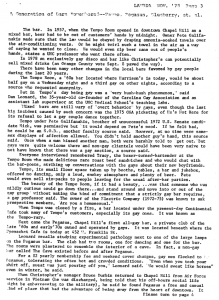
The association of both bars with Henry Watts is of particular local interest, considering that the Watts family had been engaged in a variety of businesses in Chapel Hill for some time, and were well-known by townspeople in Orange County. Henry Floyd had five brothers: Mack, Levy, Austin, Irvin, and Nick. Together over the years they also ran dry cleaning establishments.
